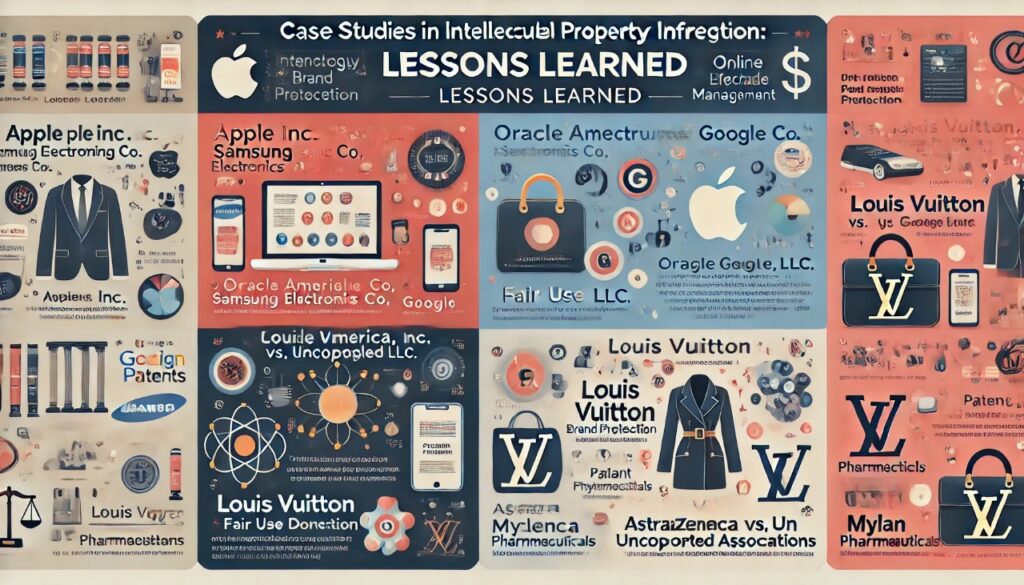Case Studies in Intellectual PropertyInfringement:
Lessons Learned

Intellectual Property (IP) Infringement: Intellectual Property (IP) infringement is a critical issue in today’s interconnected global economy, affecting a wide range of industries, from technology and entertainment to pharmaceuticals and fashion. This blog delves into several notable IP infringement cases, offering insights into their legal implications, lessons learned, and their broader impact on innovation and business practices.
1. Apple Inc. vs. Samsung Electronics Co.
Background: The high-profile legal battle between Apple Inc. and Samsung Electronics Co. is one of the most significant IP disputes in recent history. Apple accused Samsung of copying the design elements of its iPhone and iPad devices, leading to a series of lawsuits that spanned multiple countries. The case involved claims of patent infringement, design infringement, and trade dress violations.
Lessons Learned:
- Strategic Importance of Design Patents: The case highlighted the crucial role of design patents in protecting innovative product designs. Companies should proactively secure design patents to defend their unique visual elements.
- Global Enforcement Challenges: IP disputes can evolve into complex international legal battles, requiring companies to manage different legal systems and jurisdictions effectively.
- Importance of Early IP Strategy: Early identification and protection of key IP assets through patents, trademarks, and copyrights are essential for avoiding infringement disputes.
2. Oracle America, Inc. vs. Google LLC
Background: Oracle America, Inc. sued Google LLC over the use of Java APIs in Google’s Android operating system, alleging copyright infringement. Oracle contended that Google’s use of Java APIs without a license violated copyright law. The decade-long legal dispute addressed critical issues such as fair use, software interoperability, and the scope of copyright protection for programming interfaces.
Lessons Learned:
- Fair Use Doctrine: The case underscored the importance of understanding the fair use doctrine, which allows limited use of copyrighted material for purposes such as criticism, comment, and research.
- Implications for Software Developers: Developers must be aware of copyright law and licensing agreements when incorporating third-party software components or APIs into their products.
- Long-Term Legal Strategies: Legal battles involving complex technologies can have enduring effects on innovation and market competition, highlighting the need for comprehensive IP strategies and risk management.
3. Louis Vuitton vs. The Partnerships and Unincorporated Associations
Background: Luxury brand Louis Vuitton faced significant challenges related to counterfeit goods and trademark infringement. The company sued anonymous online sellers who were selling counterfeit Louis Vuitton products under various domain names. This case demonstrated the widespread issue of online counterfeiting and the difficulties in enforcing IP rights against anonymous infringers.
Lessons Learned:
- Online Brand Protection: Protecting brands in the digital marketplace is crucial, and e-commerce platforms play a vital role in combating counterfeit goods.
- Importance of Brand Reputation: Safeguarding brand reputation and maintaining consumer trust are essential for market integrity and competitiveness.
- Collaborative Enforcement Efforts: Effective enforcement against online IP infringement requires cooperation between brands, law enforcement agencies, and online platforms.
4. AstraZeneca vs. Mylan Pharmaceuticals
Background: In the pharmaceutical industry, AstraZeneca filed a lawsuit against Mylan Pharmaceuticals for infringing on the patent of its drug, Crestor (rosuvastatin calcium). The dispute involved complex legal arguments about patent validity, infringement, and regulatory exclusivity.
Lessons Learned:
- Patent Lifecycle Management: Pharmaceutical companies must manage their patent portfolios strategically throughout the drug development process to ensure market exclusivity and protection.
- Regulatory Considerations: Regulatory exclusivities, such as data and market exclusivity, are critical for safeguarding pharmaceutical innovations beyond patent expiration.
- Global Market Dynamics: Patent disputes in pharmaceuticals often have international implications, requiring navigation through diverse regulatory frameworks and market conditions.
5. Tiffany & Co. vs. Costco Wholesale Corporation
Background: Tiffany & Co., a luxury jewelry brand, sued Costco Wholesale Corporation for selling counterfeit Tiffany-branded jewelry. Tiffany alleged that Costco was marketing the jewelry as Tiffany products, which misled consumers and violated trademark rights.
Lessons Learned:
- Trademark Enforcement: Luxury brands must vigilantly protect their trademarks to prevent counterfeit products from misleading consumers and diluting brand value.
- Consumer Trust: Upholding brand integrity is essential for maintaining consumer trust and ensuring the authenticity of luxury goods.
- Retailer Responsibility: Retailers should implement measures to prevent the sale of counterfeit products and ensure compliance with trademark laws.
6. Microsoft Corp. vs. Motorola Mobility LLC
Background: Microsoft Corp. sued Motorola Mobility LLC over patent infringement related to Microsoft’s software and hardware products. The dispute centered on Motorola’s alleged infringement of patents essential to Microsoft’s technology, including those related to wireless communication standards.
Lessons Learned:
- Standard-Essential Patents (SEPs): The case highlighted the challenges associated with SEPs and the need for fair licensing practices in technology standards.
- Impact on Licensing Agreements: Disputes over SEPs can influence licensing agreements and affect industry standards, underscoring the importance of clear and fair licensing terms.
- Technological Collaboration: Companies should collaborate to resolve patent disputes amicably to foster innovation and avoid litigation costs.
7. Nike Inc. vs. Converse Inc.
Background: Nike Inc. filed a lawsuit against Converse Inc., claiming that Converse’s Chuck Taylor sneakers infringed on Nike’s design patents. The case involved allegations that Converse’s designs copied features protected by Nike’s patents.
Lessons Learned:
- Design Patent Protection: Protecting design patents is vital for maintaining a competitive edge in the fashion industry.
- Market Differentiation: Companies must differentiate their products to avoid infringement and protect their unique design elements.
- Innovation vs. Imitation: The case highlights the ongoing battle between innovation and imitation in the fashion industry.
8. Pfizer Inc. vs. Teva Pharmaceuticals USA, Inc.
Background: Pfizer Inc. sued Teva Pharmaceuticals USA, Inc. for patent infringement related to Pfizer’s popular drug, Viagra. The lawsuit involved complex issues of patent validity and exclusivity, with Pfizer seeking to prevent Teva from marketing a generic version of the drug.
Lessons Learned:
- Patent Protection for Pharmaceuticals: Maintaining strong patent protection is crucial for safeguarding pharmaceutical innovations and investments.
- Generic Competition: The entry of generic drugs into the market can impact revenue and competition, emphasizing the need for robust patent strategies.
- Regulatory Challenges: Navigating regulatory requirements for patent disputes in the pharmaceutical industry is essential for maintaining market exclusivity.
9. Bose Corporation vs. Beats Electronics LLC
Background: Bose Corporation sued Beats Electronics LLC for patent infringement, claiming that Beats’ headphones infringed on Bose’s audio technology patents. The case focused on issues of patent infringement and technological innovation in the audio industry.
Lessons Learned:
- Technology Patents: Protecting technological innovations through patents is crucial for maintaining a competitive advantage in the audio industry.
- Market Innovation: Companies must continually innovate to stay ahead of competitors and protect their technological advancements.
- Dispute Resolution: Resolving patent disputes through negotiation and litigation can impact industry standards and technological development.
10. Warner Bros. Entertainment Inc. vs. RDR Books
Background: Warner Bros. Entertainment Inc. sued RDR Books for publishing a book that was allegedly an unauthorized derivative work based on the Harry Potter series. The lawsuit addressed issues of copyright infringement and derivative works.
Lessons Learned:
- Copyright Protection: Strong copyright protection is essential for safeguarding creative works and preventing unauthorized derivative publications.
- Derivative Works: Understanding the legal boundaries of derivative works is crucial for authors and publishers to avoid copyright infringement.
- Creative Rights: Protecting the rights of creators ensures that their works are not exploited without permission or compensation.
Conclusion: These case studies of IP infringement illustrate the multifaceted nature of intellectual property disputes and their profound impact on various industries. From technology and fashion to pharmaceuticals and entertainment, protecting intellectual property rights is essential for fostering creativity, incentivizing research and development, and ensuring fair competition. As IP laws and practices continue to evolve, understanding these landmark cases provides valuable insights into navigating the complexities of intellectual property in the global marketplace.
